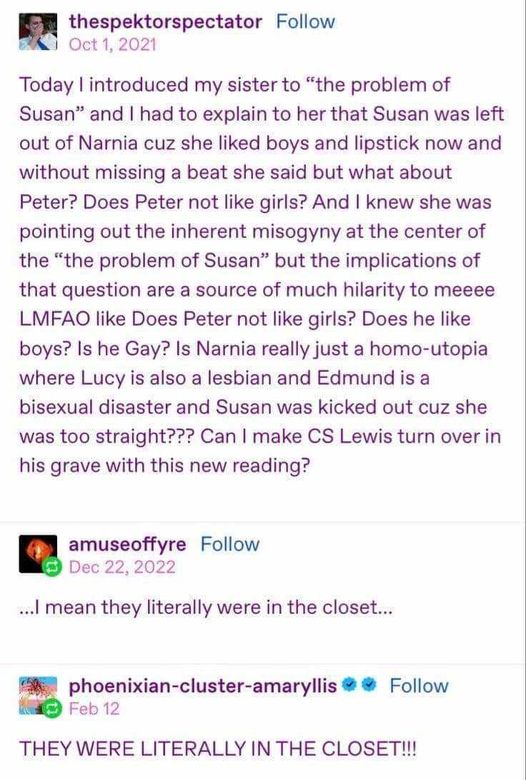this post was submitted on 20 Oct 2024
916 points (96.5% liked)
Microblog Memes
5874 readers
3171 users here now
A place to share screenshots of Microblog posts, whether from Mastodon, tumblr, ~~Twitter~~ X, KBin, Threads or elsewhere.
Created as an evolution of White People Twitter and other tweet-capture subreddits.
Rules:
- Please put at least one word relevant to the post in the post title.
- Be nice.
- No advertising, brand promotion or guerilla marketing.
- Posters are encouraged to link to the toot or tweet etc in the description of posts.
Related communities:
founded 1 year ago
MODERATORS
you are viewing a single comment's thread
view the rest of the comments
view the rest of the comments

Technically, it's a short story by Neil Gaiman. Practically, it's definitely Narnia fanfiction except just legally distinct enough Neil Gaiman didn't get sued for it.
It's basically shorthand for, "it's kinda fucked up that they left Susan Pevensie out of Narnia towards the end just because she liked lipstick and dudes now."
Especially when Peter was more than happy to sell her off for political gain in A Horse and His Boy, until he found out the slavers weren't Christian slavers.
only christian slavers for my sister 😤😤
And what for my stepsister? ಠ◡ಠ
A Horse and His Boy was terrible. Gave up halfway through and put off the series for years. Just desert desert desert lazy Muslim analogue desert desert.
Holy shit, I’m glad I’ve never read this drivel.
It's a good series, broadly speaking. You'll find a lot of the story beats repeated in subsequent fantasy novels and isekai manga (Terry Brooks, in particular, loves CA Lewis tropes, Terry Pratchett isn't shy about cribbing from them either, and Brian Jacques's Redwall plays heavily with Lewis's style).
The earlier material is definitely better. Lion, Witch, Wardrobe has been reproduced a zillion times for a reason. Prince Caspian is good. The Silver Chair is good. A Horse and his Boy is good, in large part because it heightens the drama of that last chapter of LW&W so well.
And the books are fairly short. Perfect for younger readers. We pick at the bad parts because they spoil what is largely recognized as a genre setting masterpiece. But don't throw the baby out with the bathwater. There's a lot of good material and some incredible worldbuilding in these stories.
If I’m going to read juvenile high fantasy from a controversial figure of the fifties, I think I’ll stick to Monteiro Lobato. But thanks for providing nuance and perspective.
It's the 2020s, every figure older than 3 months ago is controversial.
Big sad.
Hard disagree, it is not a good series. I just finished reading it to my kid. We saw it through in large part through discussing what was weird and why as we went.
The only redeeming factor of the series is Reepicheep.
I feel bad for your kids.
Yeah he went a little mask off in that one specifically, but most kids will miss it I think.
Unless they ask why Aslan mauled the girl who was escaping a forced marriage.
I don’t even want to know…
Gotcha! It's been a long time since I've read the Narnia books so I wasn't sure if the "lipstick and boys" was from the books or this short story.
IIRC, it wasn't that "she liked lipstick and dudes" but essentially that her thoughts of Narnia became "oh, that funny game we played as kids".
It's not her gender or orientation, it's that she lost her belief in an effort to become more "adult". The lipstick and boys bit is more to emphasize this.
Narnia is apparently like Neverland in this regard. You stop believing and the magic is gone.
The faith of children is also a recurring theme in the Bible.
Matthew 18: 2-4, for instance
1 Corinthians: 13 (one of the most-quoted chapters in the Bible, and a beautiful description of love even if you don't have faith) also compares the difference between childishness and adulthood to the difference between the partial understanding of the universe we have now to true understanding.
In order to see the magic of Narnia, childishness is required, because to see it as an adult is to see beyond the fantastical. In understanding, the ability to see the magic is lost.
Wow, I didn't realize that C.S. Lewis was riffing off of 1 Corinthians: 13 when he wrote (emphasis mine)